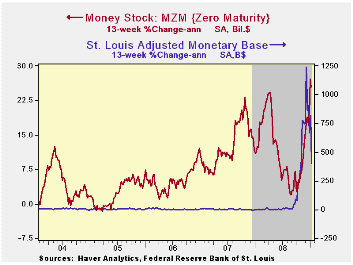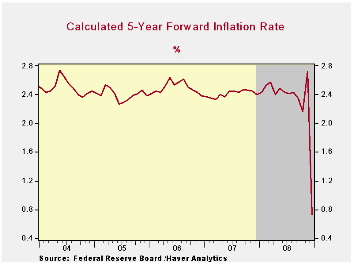 Global| Jan 28 2009
Global| Jan 28 2009FOMC Leaves Rates Unchanged
by:Tom Moeller
|in:Economy in Brief
Summary
The Federal Open Market Committee today left the Federal funds rate in a "range from 0 to 1/4 percent." The discount also was left unchanged at 0.50%. The Fed funds rate remained the lowest ever and the lack of action at this meeting [...]
 The
Federal Open Market Committee today left the Federal funds rate in a
"range from 0 to 1/4 percent." The discount also was left unchanged at
0.50%. The Fed funds rate remained the lowest ever and the lack of
action at this meeting was generally anticipated by economists.
The
Federal Open Market Committee today left the Federal funds rate in a
"range from 0 to 1/4 percent." The discount also was left unchanged at
0.50%. The Fed funds rate remained the lowest ever and the lack of
action at this meeting was generally anticipated by economists.
Regarding economic growth, the Fed indicated that "the economy has weakened further. Industrial production, housing starts, and employment have continued to decline steeply, as consumers and businesses have cut back spending ... The Committee anticipates that a gradual recovery in economic activity will begin later this year, but the downside risks to that outlook are significant."
Regarding inflation it was indicated that "the Committee sees some risk that inflation could persist for a time below rates that best foster economic growth and price stability in the longer term."
 The Fed
emphasized its concern about the recent turmoil in the credit markets.
"The Federal Reserve will employ all available tools to promote the
resumption of sustainable economic growth and to preserve price
stability ... The Federal Reserve continues to purchase large
quantities of agency debt and mortgage-backed securities to provide
support to the mortgage and housing markets, and it stands ready to
expand the quantity of such purchases and the duration of the purchase
program as conditions warrant. The Committee also is prepared
to purchase longer-term Treasury securities if evolving circumstances
indicate that such transactions would be particularly effective in
improving conditions in private credit markets."
The Fed
emphasized its concern about the recent turmoil in the credit markets.
"The Federal Reserve will employ all available tools to promote the
resumption of sustainable economic growth and to preserve price
stability ... The Federal Reserve continues to purchase large
quantities of agency debt and mortgage-backed securities to provide
support to the mortgage and housing markets, and it stands ready to
expand the quantity of such purchases and the duration of the purchase
program as conditions warrant. The Committee also is prepared
to purchase longer-term Treasury securities if evolving circumstances
indicate that such transactions would be particularly effective in
improving conditions in private credit markets."
The decision was unanimous amongst FOMC voters except that Jeffrey M. Lacker, President of the Federal Reserve Bank of Richmond, preferred to expand the monetary base at this time by purchasing U.S. Treasury securities rather than through targeted credit programs.
For the complete text of the Fed's latest press release please follow this link.
Growth in economic liquidity has risen.  The money stock measure M2 rose
at a 17.0% rate over the last three months, up from a 5% growth rate
earlier this year. The level of demand deposits has surged by
two-thirds since the Spring. In addition, the monetary base
has roughly doubled since last Spring. At the same
time, inflation expectations have fallen sharply.
The money stock measure M2 rose
at a 17.0% rate over the last three months, up from a 5% growth rate
earlier this year. The level of demand deposits has surged by
two-thirds since the Spring. In addition, the monetary base
has roughly doubled since last Spring. At the same
time, inflation expectations have fallen sharply.
The Haver databases USECON, WEEKLY and DAILY contain the figures from the Federal Reserve Board.
Need to Fix Banking Sector for Stimulus to Work is a recent article published in the IMF Survey Magazine: In the News and it can be found here.
Money, Liquidity, and Monetary Policy from the Federal Reserve Bank of New York is available here.
| Current | Last | November | 2008 | 2007 | 2006 | |
|---|---|---|---|---|---|---|
| Federal Funds Rate, % (Target) | 0.00 - 0.25 | 0.00 - 0.25 | 0.39 | 1.93 | 5.02 | 4.96 |
| Discount Rate, % | 0.50 | 0.50 | 1.25 | 2.39 | 5.86 | 5.96 |
Tom Moeller
AuthorMore in Author Profile »Prior to joining Haver Analytics in 2000, Mr. Moeller worked as the Economist at Chancellor Capital Management from 1985 to 1999. There, he developed comprehensive economic forecasts and interpreted economic data for equity and fixed income portfolio managers. Also at Chancellor, Mr. Moeller worked as an equity analyst and was responsible for researching and rating companies in the economically sensitive automobile and housing industries for investment in Chancellor’s equity portfolio. Prior to joining Chancellor, Mr. Moeller was an Economist at Citibank from 1979 to 1984. He also analyzed pricing behavior in the metals industry for the Council on Wage and Price Stability in Washington, D.C. In 1999, Mr. Moeller received the award for most accurate forecast from the Forecasters' Club of New York. From 1990 to 1992 he was President of the New York Association for Business Economists. Mr. Moeller earned an M.B.A. in Finance from Fordham University, where he graduated in 1987. He holds a Bachelor of Arts in Economics from George Washington University.
More Economy in Brief
 Global| Feb 05 2026
Global| Feb 05 2026Charts of the Week: Balanced Policy, Resilient Data and AI Narratives
by:Andrew Cates






